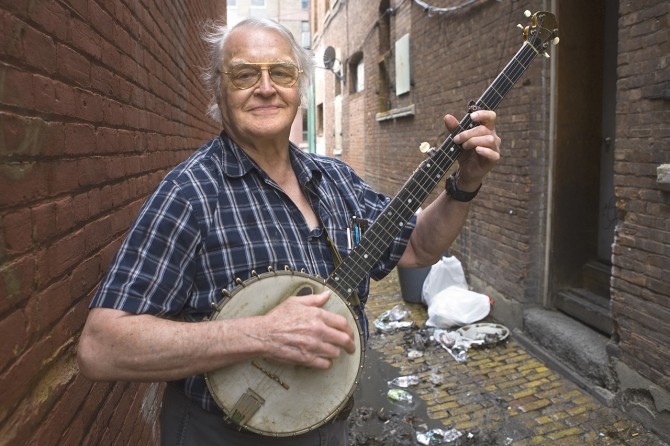Chronicle writer, local folk legend Bill Steele ’54 dies at 86
By Tom Fleischman
Wendy Grossman ’75 remembers very clearly the night in 1972 when she met her good friend, Bill Steele ’54.
“We met at a Cornell Folk Song Club party at George and Jo Houghton’s house out in Caroline,” said Grossman, a journalist and folksinger from New York City who now lives in London. “He drove me back to where I was living, and we sat in his car talking till 5 in the morning.”
It was there and then that Grossman found out what made Steele – who retired last March as a Cornell Chronicle science writer and died in a house fire Dec. 17 in Ithaca at age 86 – stand out in her eyes, and what kept their spirits tethered for nearly a half-century.
“He was funny,” she said. “He liked to tell stories; in person, he was very much like he was onstage as a folk singer. He told funny stories, he was interesting, he was smart. He was interested in science and the world around him.
“These days,” she added, “you look quite hard for people who are interested in science and factual stuff and who have a sense of humor.”
“Bill was a legend – his songs, like his persona, were clever and instantly memorable,” said fellow Chronicle writer and musician Dan Aloi, with whom Steele shared an office.
“I’d had ‘Chocolate Chip Cookies’ [one of Steele’s signature tunes] in my head since hearing it on WVBR one night in 1978,” Aloi said. “I didn’t know he was the singer-songwriter until I joined the Chronicle in 2005.”
William Varian Mitchell Steele was born Feb. 20, 1932, to Varian ’24 and Alice Pauline Mitchell Steele ’19 in St. Louis, Missouri. He spent his childhood mainly in Williamsville, New York, and graduated from Williamsville Central High.
While an undergraduate at Cornell, Steele wrote for and edited the now-defunct humor magazine The Widow, and was a member of Sigma Delta Chi, the honor society for professional journalism. He started as a physics major but earned his degree in psychology.
After serving in the Air Force, Steele moved to California and was part of the 1960s folk music scene in San Francisco. Fans of folk icon Pete Seeger might remember his rendition of the environmental anthem “Garbage!” but may be unaware that the piece was written by Steele in 1969, a year before the first Earth Day celebration.
“There was a big fuss in San Francisco at the time about dumping garbage in the bay, not as trash but as landfill to build new waterfront condominiums. So that sort of inspired it all,” Steele told Aloi in 2009 for a story marking the 40th anniversary of the song.
Steele mapped out the evolution of “Garbage!” – from three verses at a Cornell Folk Song Club party all the way to an appended version Seeger popularized.
“I sang it at a party one night, and Faith Petric stuck a microphone in my face,” Steele said. “Larry Hanks learned it from Faith, and he went and sang it at some festival in Michigan, where Michael Cooney learned it, and that’s who Pete Seeger learned it from. That’s the folk process: the oral transmission of song from one person to another.”
Steele returned to Ithaca following the death of his mother in December 1971. “At the time, he really intended to go back to San Francisco, but he never did,” Grossman said.
He made two albums – “Garbage! And Other Garbage” (1973) and “Chocolate Chip Cookies” (1977); the title track of the latter for years was part of the Girl Scout songbook. Both albums are available for free download at billsteelesongs.com.
One of his more popular songs was a tribute to the folksong-writing process itself – “A Thousand Songs,” which he penned while traveling from a festival in California to one in New York. “The title might be hyperbole,” he wrote on his website, “but at some festivals, particularly when the parties last till dawn, we might come close.”
His love of science and then a relatively new phenomenon – personal computers – brought him back to his alma mater in the early 1990s. He took a job at the Cornell News Service as a temporary writer in 1994, and lent his computer expertise to the organization in helping get the News Service and Cornell Chronicle websites up and running.
Shortly thereafter, he took a permanent position with the Chronicle as a science writer, a position he held until his retirement in March.
Karen Walters, senior director for news, said, “I am so saddened by the loss of Bill,” whose death came just a week after the sudden passing of George Lowery, the Chronicle’s managing editor.
“Bill was a true Renaissance man – a brilliant writer, talented singer-songwriter and legendary geek,” said Walters, with whom Steele shared a love of science fiction. “Years ago we would discuss films of the 1930s, the latest episode of ‘Buffy the Vampire Slayer’ and the Apple Script program he was writing for the website – all in the same conversation.”
Steele wrote deftly about physical and computer sciences, making them accessible to lay readers – no small task.
“I often referred to Bill as the ‘king of analogy,’” Walters said. “He had a real gift for making the most complex scientific concepts relatable. He explained his approach to storytelling as writing for his insatiably curious 10-year-old self. He will be missed.”
Media Contact
Get Cornell news delivered right to your inbox.
Subscribe

